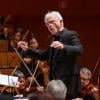
Gustavo Dudamel’s concerts with the Los Angeles Philharmonic over the weekend invited some speculation about how they came into being.
Take Richard Strauss’s large-scale tone poem Don Quixote, the centerpiece of the program at Walt Disney Concert Hall on Sunday afternoon, May 5. Did Dudamel’s recently adopted Spanish identity — he became a citizen of Spain in 2018 — inspire him to look into a work that is virtually a musical summary of Miguel de Cervantes’s epic Spanish novel? Or did Dudamel have in mind that Don Quixote was the big work on his idol Leonard Bernstein’s career-making, last minute 1943 debut with the New York Philharmonic, the orchestra that Dudamel will inherit in 2026?

Who knows? What we do know is that Dudamel wanted a companion work on the program also inspired by Don Quixote, so he commissioned a new piece from Portuguese composer Andreia Pinto Correia to lead off the concert. Cortejo is an 11-minute work that’s more than the single cortege, or procession, of its title. The “Procesión” segments, the first of which starts with blasts from the snare drum, mallet instruments, and other battering metal percussion, occur three times within the piece, separated by “Claroscuro” passages full of atmospheric strings and wind cluster chords that sound partly like Béla Bartók and partly like Louis Andriessen. It’s a fascinating, compact slice of alternately clangorous and mysterious modernisms, and Dudamel led the world-premiere performances dynamically.
Continuing with the Portuguese connection, and the Iberian Peninsula more generally, the esteemed pianist Maria João Pires, now 79, made her debut with the LA Phil. Pires announced in 2017 that she would no longer tour after 2018, but here she is on a North American tour, appearing in Montreal, Atlanta, Kalamazoo, Los Angeles, and Chicago, after which she will go on to Europe from the end of May through June. (On doctor’s orders, she did have to cancel several South American concerts last fall.)
The original concert announcement had Pires playing Mozart, but she switched to Beethoven’s Piano Concerto No. 4, and her impeccably poised, ever-so-subtle statement of the opening chords signaled what the rest of her performance would be like. It was a gentle, genteel, even elegiac rendition of the piano part, the ends of phrases seeming to melt into the air. In the first movement, Dudamel was thoroughly attuned to Pires’s romantic, subdued, highly nuanced conception, whereas the gap in the second movement between the orchestra’s gruffly combative statements and the soloist’s nearly hermetic responses was miles wide. That’s the way it’s written, yet the contrasts were exceptionally vast here. While Dudamel turned on the gas jets in the finale, Pires’s mood continued. I would have preferred a Beethoven Fourth with more energy, but this one still made pertinent poetic points.

Don Quixote, one of Zubin Mehta’s specialties at the Phil half a century ago, is a chance to show off the capabilities of three principal string players. With cellist Robert deMaine painting a noble, jaunty, full-blooded portrait of feckless Don Quixote, violist Teng Li applying her solid, robust tone quality to the forthright Sancho Panza, and concertmaster Martin Chalifour in superb singing form, it would be tough for any orchestra to match this team.
What was powerful about Dudamel and the LA Phil’s performance was the crystalline, detailed textures they produced in Disney Hall, three-dimensional in front-back, left-right separation, a sonic feat that is still difficult to capture on a recording and is rare in Strauss, even live. The more unusual episodes in the piece — the burry, fuzzy, stinging sound of the brass simulating sheep, the overwhelming “Ride Through the Air,” with its exotic wind machine and thrumming double basses on a single note — made their desired impact. An excellent performance overall.
From here to the end of the 2023–2024 season, it will be rerun time for the LA Phil, warm-up performances of works that Los Angeles has already heard but that are part of the orchestra’s upcoming European tour. These include Gabriela Ortiz’s Altar de cuerda, Antonín Dvořák’s “New World” Symphony, the production of Beethoven’s Fidelio with Deaf West Theatre, and John Williams’s Olympic Fanfare and Theme. It’s a blend of the Phil’s distinctively creative programming — something brand-new, something ultrafamiliar, and something unusual, plus a timely reminder of where the Olympic Games are being held now (Paris) and next time (Los Angeles).




